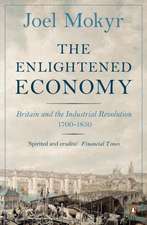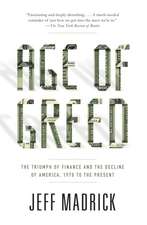The Birth of Big Business in the United States, 1860-1914: Commercial, Extractive, and Industrial Enterprise
Autor David O. Whitten, Bessie E. Whittenen Limba Engleză Hardback – 29 noi 2005 – vârsta până la 17 ani
Preț: 474.60 lei
Preț vechi: 645.26 lei
-26% Nou
Puncte Express: 712
Preț estimativ în valută:
90.82€ • 95.01$ • 75.44£
90.82€ • 95.01$ • 75.44£
Carte tipărită la comandă
Livrare economică 03-17 aprilie
Preluare comenzi: 021 569.72.76
Specificații
ISBN-13: 9780313323959
ISBN-10: 031332395X
Pagini: 222
Dimensiuni: 156 x 235 x 22 mm
Greutate: 1.2 kg
Ediția:New.
Editura: Bloomsbury Publishing
Colecția Praeger
Locul publicării:New York, United States
ISBN-10: 031332395X
Pagini: 222
Dimensiuni: 156 x 235 x 22 mm
Greutate: 1.2 kg
Ediția:New.
Editura: Bloomsbury Publishing
Colecția Praeger
Locul publicării:New York, United States
Notă biografică
David O. Whitten is Professor of Economics at Auburn University. He is the author of A History of Economics and Business at Auburn University (1992) and Andrew Durnford: A Black Sugar Planter in the Antebellum South (1995) co-author, with Douglas Steeples, of Democracy in Desperation: The Depression of 1893 (1998),and editor of Eli Whitney's Cotton Gin, 1793-1993 and Essays in Economic and Business History, the journal of the Economic and Business Historical Society.Bessie E. Whitten is editor (with David O. Whitten) of Manufacturing: A Historiographical and Bibliographical Guide (1990), Extractives, Manufacturing, and Services: A Historiographical and Bibliographical Guide (1997), and Infrastructure and Services: A Historiographical and Bibliographical Guide (2000), volumes 1-3 of the Handbook of American Business History,and of Business Library Review International, a journal of refereed articles, book review articles, and book notes (1988-2001).
Cuprins
PrefaceIntroductionPart I Backgroundchapter 1. American Business in the Civil Warchapter 2. Giant Business in Communications and TransportationPart II Giant Commercial Enterprisechapter 3. The Commercial Response to a Mass Marketchapter 4. The United Fruit Companychapter5. The Singer Sewing Machine CompanyPart III Giant Firms to Exploit Natural Resources: Extractive Industrieschapter 6. Giant Farmschapter 7. The American Sugar Refining Companychapter 8. The American Tobacco Companychapter 9. The Forest Products Industrychapter 10. MiningPart IV Industrial Giants: The Manufacturing Titanschapter 11. Standard Oil Corporationchapter 12. United States Steel Corporationchapter 13. The Meat PackersSelected BibliographyIndexAbout the Authors
Recenzii
The authors accurately describe this volume as an introductory work that draws together diverse threads of US business history; it provides a straightforward account of the rise of American big business, characterized by increasing efficiency and productivity alongside the growth of monopolistic forces..Readers will enjoy the way the authors, an academician and scholarly editor respectively, put modern business practices into historical context. This book provides a considerable amount of detail while being engaging enough to hold the interest of general readers and undergraduates. Recommended. Public and academic library collections, lower-division undergraduate and up.
[O]ffers a good foundation for understanding why big businesses appeared after the Civil War, and the role of the government in this process. As such it serves as a springboard for undergraduates and general readers who wish to delve deeper into the field of business history.
[O]ffers a good foundation for understanding why big businesses appeared after the Civil War, and the role of the government in this process. As such it serves as a springboard for undergraduates and general readers who wish to delve deeper into the field of business history.













